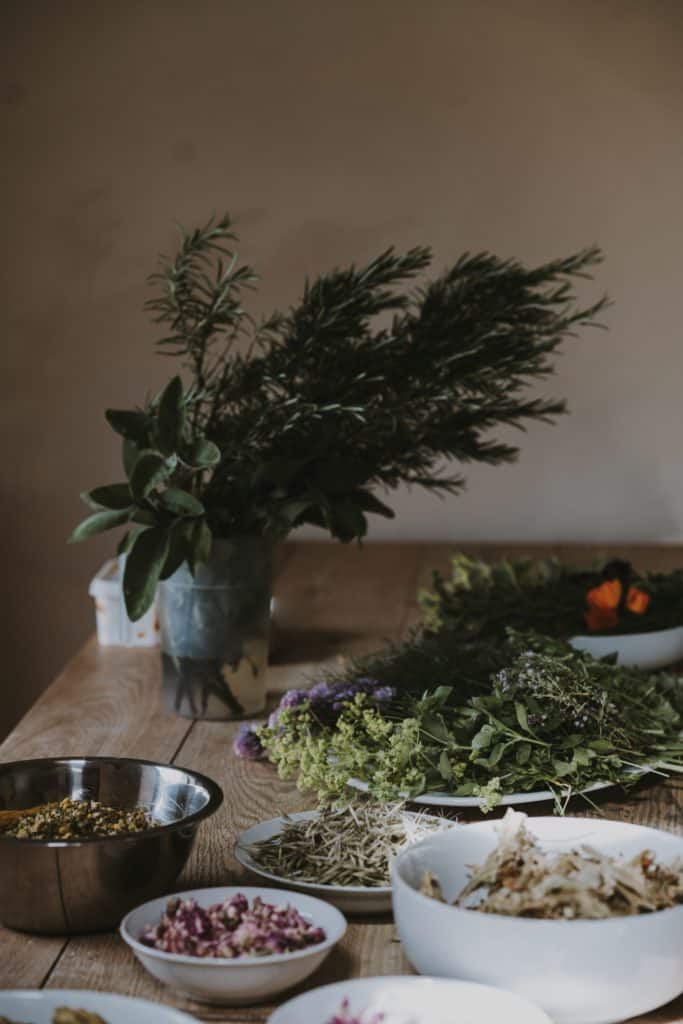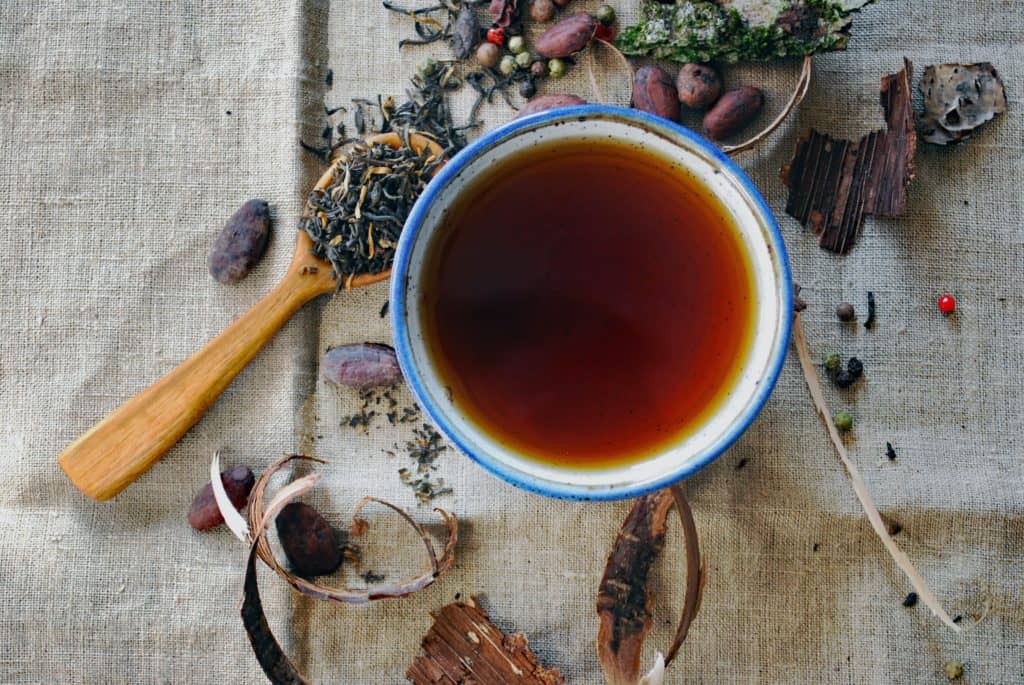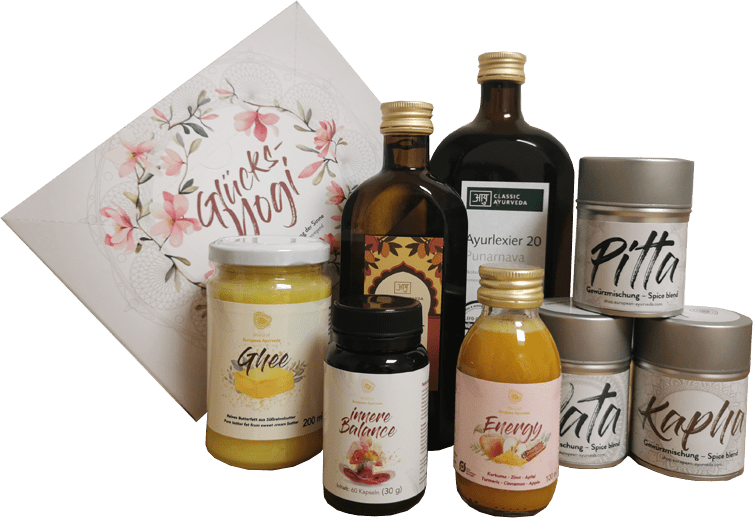It is said that against every evil there is a herb. In fact, nature has gifted us with an abundance of herbs and medicinal plants. For relief in case of pain, calming in case of nervousness or refreshment in case of thirst as well as warmth in case of frosty days. But tea drinking is also important as a ritual in various cultures. It gives structure to the day, serves to slow down, rest and bring people together. You're more likely to have good conversations over a cup of tea than arguments. Often the tea has to steep, so that its full flavor can unfold. Your stress level will drop almost automatically. And the right Ayurvedic tea for your Dosha will additionally provide even more harmony.
"Tea awakens the good spirit and wise thoughts. It refreshes the mind. If you are depressed, tea will cheer you up." (Shen Nung)

Your cup of tea - Your Ayurveda tea from natural herbs
Even though drinking tea is a year-round pleasure, we reach for the teapot more often during the cold months. In Ayurveda, teas are particularly important because they can bring the doshas into balance. With our concept of European Ayurveda® we want to adapt the ancient Indian healing teachings to our modern European challenges. This includes using our local herbs and plants for our own tea blends. Many of these are planted and carefully harvested on our family-owned Lindhof farm. Tailored to the needs of specific constitutional types, we have the right Ayurvedic tea for your Dosha in our World of European Ayurveda® range.
The right EA® Tea for your Vata Dosha
In autumn, the Vata dosha is especially noticeable. It consists of the elements space and air. No matter what dosha type you are, Vata automatically increases during this season. And with it, certain problems that Vata types experience around the year. These include restlessness, nervousness, cold, dryness, weak digestion, flatulence, too much or too little appetite, insomnia or headaches. With our European Ayurveda® Herbal and Spice Tea Vata you can counteract an excess of Vata through the special active powers of the natural herbs contained in it. The following is contained in this Ayurveda tea:
- Ginger: heats you up and boosts your agni for good digestion
- Cinnamon: calms your nerves, soothes your aches and pains, has anti-inflammatory effects.
- Lemon balm: Mood enhancer, promotes a good night's sleep
- Basil: good go flatulence and loss of appetite
- Fennel: sweetish taste, has a calming effect and helps with respiratory problems
- Licorice roots: good for colds, promotes healthy breathing and digestion
- Pippali pepper: pungent taste, facilitates breathing, stimulates the immune system.
- Black pepper: warms you internally and helps with digestive problems
- Marshmallow root: good for dry cough, soothes irritation
- Dill: antispasmodic, stimulates digestion

The right EA® tea for your Kapha Dosha
Kapha comes out especially in winter - that is, in the cold season. It consists of the elements water and earth and is predominantly determined by the characteristics heavy, cool and immobile. If you are a Kapha type in general, tendencies to depressive mood, fatigue, oily skin, weight gain, sluggishness and colds with mucus production may appear more frequently. In other words, conditions that we all struggle with to some extent during the cold winter season. Our European Ayurveda® tea blend Kapha helps with natural treasures of nature for a gentle balance:
- Ginger, cinnamon, pepper, basil and pippali pepper are also included in Kapha tea. These have a warming effect, strengthen the immune system, help with mucus-forming diseases of the respiratory tract and support the metabolism.
- Cloves: stimulate the heart and liver, have a stimulating, expectorant and analgesic effect.
- Aniseed: stimulates digestion, has antispasmodic, antibacterial and expectorant effects.
- Cardamom: heats your Agni, promotes digestion, gives you energy
- Turmeric: spicy and bitter taste, improves metabolism, gives you warmth
- Green tea Sencha: boosts fat burning, strengthens the immune system, has a stimulating and energizing effect due to the contained caffeine
- Orange peels: stimulate the metabolism and strengthen the immune system
- Elderflower: sweet taste, expectorant, anti-inflammatory
The right EA® tea for your Pitta Dosha
Typical of the fire element, Pitta comes out especially in summer. The characteristics are hot and oily. Temper in the mind, however, can lead to disharmony in part because Pitta types are prone to aggression and fits of anger. If your Pitta dosha is overpowering, you are prone to sweating, diarrhea, skin irritation, heartburn, hyperacidity, and inflammation. Anything that cools does a good job of putting Pitta in its place. And here again the healing powers of fantastic herbs come into play. We've put them together for European Ayurveda® Tea Pitta, so you can quickly get back in balance. These include:
- Licorice root, ginger, cinnamon, cardamom and fennel are back. Less because of the warming effect - Pitta doesn't need that - but because the herbs have anti-inflammatory, digestive and calming effects.
- Peppermint: cooling, analgesic for headaches, soothing, sleep-inducing.
- Coriander: cooling effect, sweetish taste
- Yarrow: good against inflammation, migraine, stomach ailments
- Jasmine flowers: have a calming effect, optimize metabolism
- Rose petals: tart taste, soothing, cooling
- Hibiscus: thirst-quenching, purifying, stimulates the metabolism
- Beet: anti-inflammatory, good for the bile
- Lavender: good against flatulence, migraine, inner restlessness, inflammations





